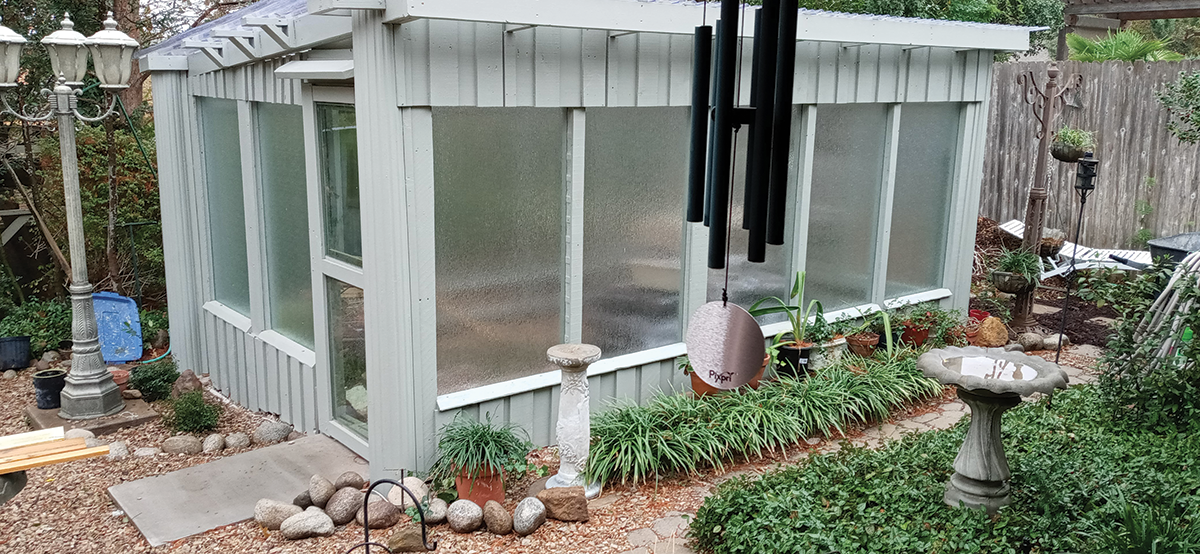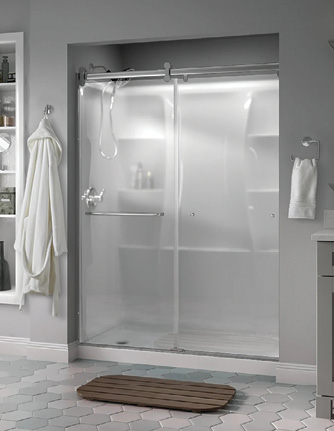Repurposing Unwanted Glass
Company finds new homes for industrial waste

Above: The rain-pattern shower glass was repurposed for a “She Shed” residential structure.

Repurposed Materials Inc. calls itself an “industrial thrift store,” according to Founder and President Damon Carson. The company finds new homes for the “cast-offs and discards of American industry,” including glass. They have six warehouses across the U.S. that are about a one-day truck drive from anywhere in the country, give or take.
Without a national glass recycling infrastructure, the company offers an opportunity to reuse and repurpose architectural glass.
How it works
Companies call Repurposed Materials and let them know what materials they have that are not needed or wanted. Sometimes businesses or people replace the old glass or order the wrong sizes and cannot return them, but they want to keep the glass out of a landfill. Repurposed Materials picks it up and then stores it in a warehouse until someone else, whether an individual or another company, calls them or checks their website to see if they have a particular material available.
One example is an Apple store in Palo Alto, California, which had 7-by-30-foot glass atrium skylights that were being replaced with new ones. Apple’s subcontractors contacted Repurposed Materials to keep this glass out of a landfill. Repurposed Materials then brought four semi-trucks to Palo Alto, picked up the crates of glass and brought them to their Arizona warehouse.
Those 14 pieces of glass were rehomed over three months. Ten pieces went to someone in Washington building a large sustainable home, and the other four went to an organic winery in North Carolina.
How it’s helping
“One of the questions we often hear is, ‘Does repurposing make more sense environmentally or economically?’ For companies like Apple, it makes sense environmentally because we’re helping them divert their unwanted materials from the landfill,” says Carson. “For our customer base, it makes economic sense; they typically save 50% to 75% over buying that same product or material new.”
Hopes moving forward
“We would love to help more glass manufacturers, distributors, glaziers and architects because it is interesting to me that within the U.S. glass industry there’s a lot of unwanted glass that comes in for all kinds of different reasons,” says Carson.
“‘It doesn’t fit this project,’ ‘it was a half-inch too long,’ ‘it’s a half-inch too short,’ ‘they want this tempering now instead of this tempering’—these are some of the reasons people need to rehome glass,” says Carson. “Then there are six crates of glass that don’t fit the new specifications. In that situation, we could be a resource over time to the industry.”
Companies from all parts of the glass and glazing industry have implemented innovative, out-of-the-box ideas to improve business from the ground up. Here’s an Idea showcases these sometimes small behind-the-scenes ideas that can make a big impact on a company’s bottom line. If you have an idea that you would like to share, contact Norah Dick, ndick@glass.org.

